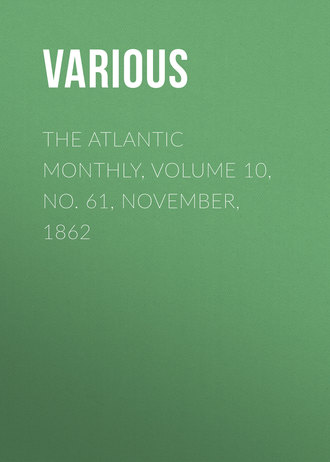 полная версия
полная версияThe Atlantic Monthly, Volume 10, No. 61, November, 1862
See Gerebtzoff, Histoire de la Civilisation en Russie.
3
Haxthausen.
4
The late Samuel Colt.
5
Haxthausen, Études sur la Situation Intérieure, etc., de la Russie.
6
Gurowski,—also Wolowski in Revue des Deux Mondes.
7
For further growth of the sentimental fashion thus set, see Memoirs of the Princess Daschkaw, Vol. I. p. 383.
8
For proofs of this see Haxthausen.
9
Gurowski says that they used brilliantly "Cursed beCanaan," etc.
10
For choice specimens of these reasonings, see Von Erman, Archiv für Wissenschaftliche Kunde von Russland.
11
This sketch is given from notes taken at the audience.
12
Gerebtzoff, Histoire de la Civilisation en Russie,—Wolowski, in Revue des Deux Mondes,—and Tegoborski, Commentaries on the Productive Forces of Russia, Vol. I. p. 221.
13
Procès en Diffamation du Prince Simon Worontzoff contre le Prince Pierre Dolgornokow. Leipzig, 1862
14
These Gifts, the private enterprise of an invalid lady, the same who first brought the subject of Kindergartens so favorably before the public in the Christian Examiner for November, 1858, can be procured at the Kindergarten, 15 Pinckney Street, Boston.
15
See Common School Journal for 1842-3.
16
Calkin's Object Lessons will give hints.
17
Ten days later, in the Senate, with a face full of the combined erubescence of revolutionary enthusiasm and unstatesmanlike anger, Mr. Toombs closed a speech to the Northern Senators in the following amazing words, (Congressional Globe, 1860-61, p. 271,) which justify, it will be seen, every syllable of the report of the conversation upon the same points:—
"You will not regard confederate obligations; you will not regard constitutional obligations; you will not regard your oaths. What am I to do? Am I a freeman? Is my State, a free State, to lie down and submit because political fossils raise the cry of 'The Glorious Union'? Too long already have we listened to this delusive song. We are freemen. We have rights: I have stated them. We have wrongs: I have recounted them. I have demonstrated that the party now coming into power has declared us outlaws, and is determined to exclude four thousand millions of our property from the common territories,—that it has declared us under the ban of the empire and out of the protection of the laws of the United States, everywhere. They have refused to protect us from invasion and insurrection by the Federal power, and the Constitution denies to us in the Union the right either to raise fleets or armies for our own defence. All these charges I have proven by the record, and I put them before the civilized world, and demand the judgment of to-day, of to-morrow, of distant ages, and of Heaven itself, upon these causes. I am content, whatever it be, to peril all in so noble, so holy a cause. We have appealed time and time again for these constitutional rights. You have refused them. We appeal again. Restore us these rights as we had them, as your court adjudges them to be, just as all our people have said they are, redress these flagrant wrongs, seen of all men, and it will restore fraternity and peace and unity to all of us. Refuse them, and what then? We shall then ask you to 'let us depart in peace.' Refuse that, and you present us war. We accept it; and inscribing upon our banners the glorious words, 'Liberty and Equality,' we will trust to the blood of the brave and the God of battles for security and tranquillity."
Sincere, but undoubtedly mistaken, Mr. Toombs! To this philippic, let the words of another Southern, but not sectional Senator, reply, and that from a golden age:—
"But if, unhappily, we should be involved in war, in civil war, between the two parts of this Confederacy, in which the effort upon the one side should be to restrain the introduction of slavery into the new territories, and upon the other side to force its introduction there, what a spectacle should we present to the astonishment of mankind, in an effort, not to propagate right, but—I must say it, though I trust it will be understood to be said with no design to excite feeling—a war to propagate wrong in the territories thus acquired from Mexico. It would be a war in which we should have no sympathies, no good wishes, in which all mankind would be against us; for, from the commencement of the Revolution down to the present time, we have constantly reproached our British ancestors for the introduction of slavery into this country."—HENRY CLAY, Congressional Globe, Part II., Vol. 22, p. 117.









